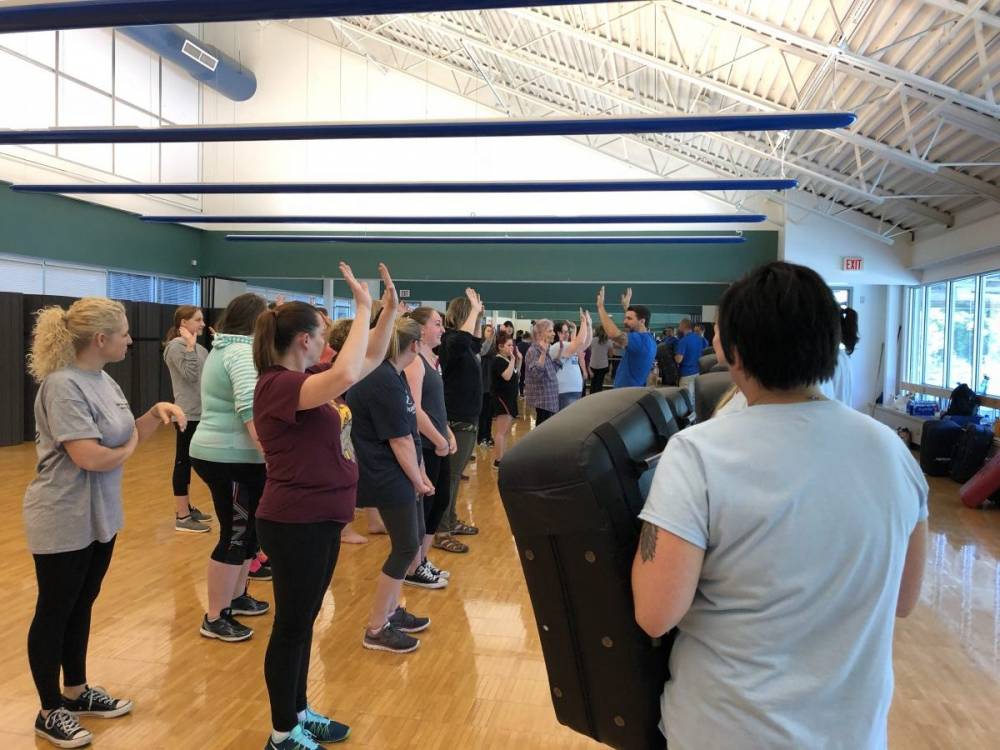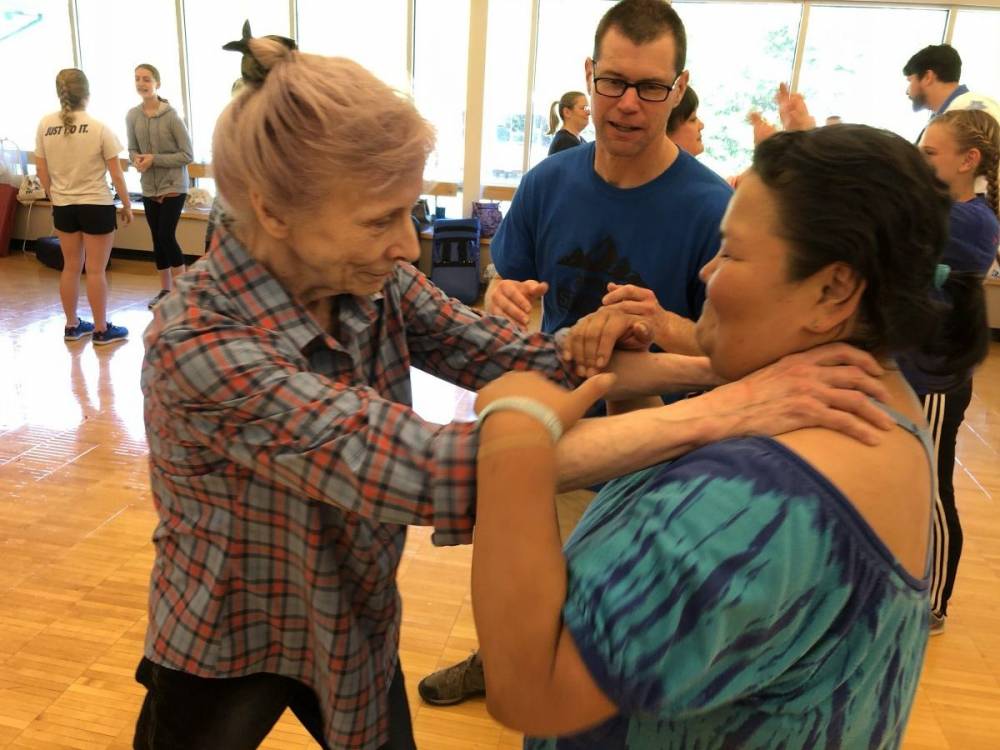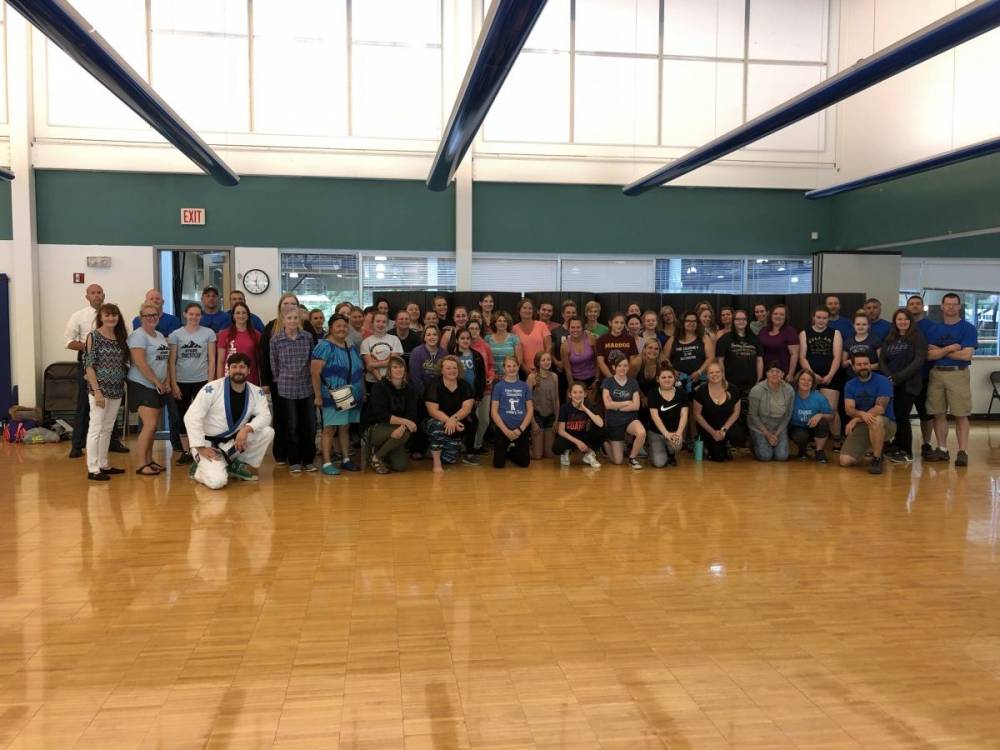
Women line up ready to hit boxing pads at the Gateway Recreation Center. (KRBD Photo – Liam Niemeyer)
On the second floor of the Gateway Recreation Center, women are lined up in front of instructors holding black boxing pads. The woman in front of each line is told to hit the pad as hard as they can in any way while another woman holds them back.
On the word “go,” things get pretty chaotic; Heidi Bauer, one of close to 50 women here, falls on the floor trying to get out of a headlock. After successfully hitting the pad several times, she gets up from the ground relatively unscathed.
“I’ve never kicked somebody repeatedly. This is new territory — for real. And I’m learning by watching these other women,” Bauer said.
Like many other women here, she came to this self-defense and empowerment workshop to find ways to defend herself.
“It’s about building women up, giving women the confidence to do whatever they need to do, whatever that looks like for them.”
And for Clint Shultz, who organized this free annual workshop, that’s the goal.
“It’s just getting people in general to understand they have an inner strength and inner ability to protect themselves, and we just need to tap into that and see what it looks like. What we try to do is that we try to bring out that strength, and that’s what brings out the empowerment, Shultz said.
Shultz runs the Elite Defense Institute in Ketchikan, which teaches people self-defense techniques using “Krav Maga”, a fighting style from Israel. That’s what these women are learning.
“There’s not a lot of stepping, there’s not a lot of moves. It’s really about your natural reaction and being able to fight back with a huge amount of aggression to be able to escape,” Shultz said.
Teenage girls and grandmothers stand side-by-side, punching and kicking pads because of a glaring issue — rates of violence against women are high in Ketchikan.
The University of Alaska-Anchorage released survey results in 2013 showing one out of every two women in Ketchikan will experience intimate partner violence or sexual violence in their lifetime. That’s slightly higher than the rate reported by the Centers for Disease Control in 2015.
Women In Safe Homes Prevention Manager Arika Paquette came to the workshop to speak to the women about the resources available to help victims of attacks. She said having any form of self-defense training is helpful.
“Women who are attacked and who do fight back, whether or not they are successful in ending the attack, actually have better mental outcomes. And also, we want to teach people to defend themselves,” she said.
But she said workshops like this are only part of the solution of reducing violence in Ketchikan. It’s a reactionary measure meant to tackle the issue as it is right now. The other tactic is prevention, which can be much more of a long-term effort. It’s about changing beliefs.
“The main solution is that we need equity among genders. So, root causes of violence is if you live in a society that really values male domination, it’s a power-based violence.”
At Ketchikan Indian Community, Hailey Beard and Rick Pickrell are trying to change those beliefs. They work with victims of domestic abuse and people with domestic abuse charges to help them understand what domestic abuse truly is and why some of their previously-held beliefs about relationship roles might be wrong.
Many victims don’t know the definition of rape or sexual assault.
“When women come in for protective services or help, they don’t realize or don’t even consider themselves being raped or sexually assaulted, because it’s this perspective that you can’t be raped by your partner or you can’t be raped by someone you’re with,” Batterers Intervention Program Specialist Rick Pickrell, said.
Some men who are charged with domestic abuse come in with notions that the only way they can have control over a family or relationship is through violence. It often takes generations for different beliefs to take hold.
“It does take a long time for there to be a generational shift. It’s just little seeds planted in social norms,” Domestic Violence Program Specialist Hailey Beard, said.
Beyond prevention, another issue is the lack of current data on violence in Ketchikan.
Arika Paquette said University of Alaska survey results from 2013 are outdated and only included women, even though both women and men experience violence. And more updated stats from the CDC and FBI don’t tell the full picture in terms of who is experiencing what.
Paquette said WISH is about to conduct an updated survey that would include women and men of all races and ethnicities, and seasonal residents.
They’ll also gather yearly and lifetime statistics on violence in Ketchikan to get a better idea of what is happening in Ketchikan at the moment. If results find more people reporting violence in recent years, then it might be a sign younger generations are willing to speak out.
“Then you know people are feeling like they don’t have to be private. That they have resources and options available to seek justice, whether it be through the criminal justice system or whether seeking services to help their healing and all that stuff,” Paquette said.
Along with gathering data about physical and emotional abuse, they’ll also survey people on behaviors like social media stalking and harassment. She said these behaviors often are precursors to other forms of violence.
WISH hopes to have the survey completed by December, giving new context to the need for self-defense workshops.







